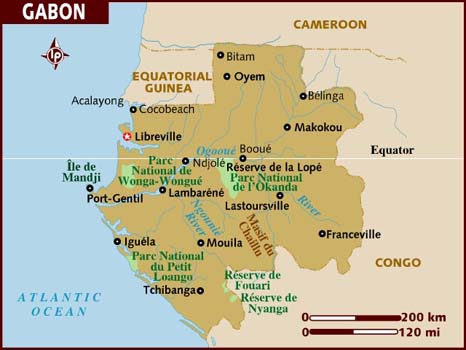Gabon under control: Government
January 9, 2019 | Expert Insights

The political situation in Gabon is "under control" following an attempted military coup, a spokesman for the government has said.
Five rebels had announced a coup to take over the country which has been ruled by the Bongo family for more than half a century.
Background
Gabon is a country on the west coast of Central Africa. It has an area of nearly 270,000 square kilometres (100,000 sq mi) and its population is estimated at 2 million people. Its capital and largest city are Libreville. Abundant petroleum and foreign private investment have helped make Gabon one of the most prosperous countries in Sub-Saharan Africa, with the 4th highest HDI[4] and the fourth highest GDP per capita (PPP).
Ever since its independence from France in 1960, the sovereign state of Gabon has had three presidents. In the early 1990s, Gabon introduced a multi-party system and a new democratic constitution that allowed for a more transparent electoral process and reformed many governmental institutions.
The ruling Bongo family has been in power for more than half a century and continues to rule despite criticisms of corruption, nepotism and using force to crush dissent.

Analysis
A government spokesperson has said that the political situation in Gabon is "under control" following an attempted military coup by five ‘rebel’ soldiers. All five of the rebels who tried to take charge have now been arrested by the authorities.
The junior officers claimed they seized power "to restore democracy" in oil-rich Gabon, where the ailing leader's family has ruled for 50 years. Tanks and armoured vehicles could be seen in the capital Libreville. One of the rebels was on the run for a brief period, before being found hiding under a bed.
"The situation is calm. The gendarmes who are often stationed there have taken control of the entire area around the radio and TV headquarters, so everything is back to normal", said Guy-Bertrand Mapangou. a government spokesman. Mr. Mapangou said that the army generals, civil society and opposition leaders mentioned in the rebels' statement as potential supporters would be investigated.
The current leader Ali Bongo succeeded his father Omar Bongo as president in 2009. He narrowly won re-election in 2016 in a poll marred by violence and accusations of fraud. The president's term in office has been overshadowed by a long-running French investigation into allegations of embezzlement involving the Bongo family's assets. Mr. Bongo, who has been out of the country for two months, reportedly suffered a stroke in October and received treatment in Morocco.
He sought to put an end to the rumours about his health with a televised new year message in which he said he was feeling fine. Soldiers said they had been disappointed by the message, calling it "a pitiful sight" and a "relentless attempt to cling onto power." However, his supporters point to his role in attempting to diversify Gabon's oil-dependent economy, in the face of declining oil reserves.
The geostrategic importance of Gabon cannot be overstated. President Trump has deployed soldiers to Gabon to protect US citizens amid fears of violent protests in the nearby Democratic Republic of Congo following its presidential election. Despite its colonial history, Gabon has had a relatively stable political environment with only three presidents since 1960. Analysts said the coup attempt came as a huge surprise. The army has always been seen as loyal to the Bongo family because it is dominated by the presidential guard, who mostly come from Mr. Bongo's home region.
Most of the capital remains calm while the French government and the African Union condemned the attempted coup.
Assessment
Our assessment is that the coup attempt in Gabon has been peacefully handled with no casualties and injuries. We believe that the rebel group were quite frustrated with the government and took matters into their own hands instead of going through the proper channels of administration.








Comments